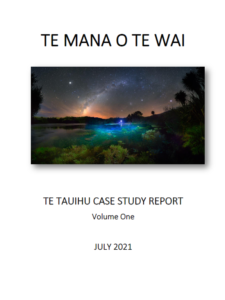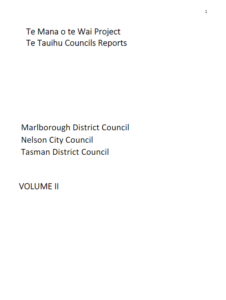This report, Te Mana o Te Wai Case Study Report Volume I. has been prepared for the iwi of Te Tauihu o te Waka-a-Māui as a case study contributing to a nation-wide project commissioned by the Our Land and Water National Science Challenge: Enacting Te Mana o te Wai through Mātauranga Māori.
The six iwi o Te Tauihu involved in this project are Ngāti Apa ki te Rā Tō, Ngāti Koata, Ngāti Kuia, Te Rūnanga o Ngāti Rārua, Ngāti Tama Ki Te Waipounamuand Te Ātiawa Manawhenua Ki Te TauIhu. Representatives fromRangitāneo Wairau and Ngāti Toa Rangatira maintained a watching brief through the project.
The introduction sets the scene with information about the rohe and waterways of Te Tauihu, Te Tiriti o Waitangi and the Treaty, the worldview of Te Ao Māori and the wider research programme (Chapter1).
Te Ao Māori, and the many interconnected levels of value, meaning and significance of te taiao, wai, waterways and taonga of the rohe to whānau, hapū and iwi are then explored. This includes consideration of kaitiakitanga, manaakitanga and mātauranga Māori as they relate to wai and the lakes, tarns, springs, rivers, streams, wetlands and groundwater of the rohe (Chapter2).
Findings of the Waitangi Tribunal’s 2008 report on the Te Tauihu claimsrelating to wai, waterways and freshwater fisheries, and to the Crown’s systems for environmental management are presented (Chapter3).
The current thinking of ngā iwi o Te Tauihu includes their views of wai and their responsibilities as kaitiaki for te taiao. Iwi thinking on the current environmental management systems under the Resource Management Act 1991 (RMA)includes their assessments of what is working well, what is not working well, tools to give effect to cultural values and gaps in knowledge. Key issues identified include: the need to move from reactive to proactive mode, the chronic lack of resourcing and capacity and the need for iwi to have a role in decision making(Chapter4).
The report summarises the challenges of management for wai and waterways and outlines the opportunities provided by the requirements of the new National Policy Statement for Freshwater Management 2020 (NPS-FM) and Te Mana o te Wai(Chapter5).
The final Chaptersums up the findings and offers recommendations to assist ngā iwi, councils and other Crown agencies to implement the NPS-FM and give effect to Te Mana o te Wai (Chapter 6).


